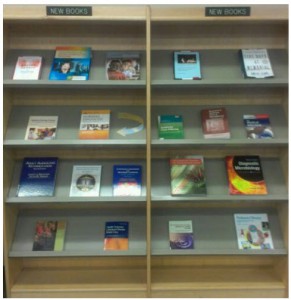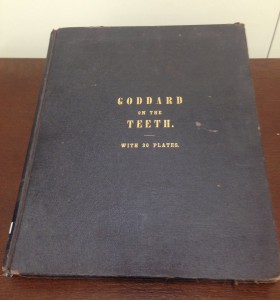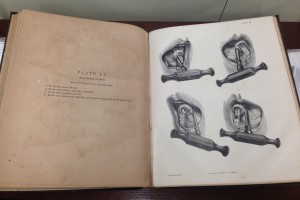Doody’s Precision Search not working
Doody’s Precision Search is not working. We will let you know when access has been restored.
Doody’s Precision Search is not working. We will let you know when access has been restored.
The Isché Library is featuring 20 newly acquired books for the latter part of April and all of May. The subjects include nursing, physical therapy, occupational therapy, communication disorders, education, ethics, etc.
These books CAN be checked out!

New Books Display April/May 2014
Featured books include:
Happy Reading!
Thanks to other groups on campus, the Libraries have created pages for 2 funding sources available to all LSUHSC faculty, staff and students.
Grant Forward is the newly revised IRIS database and is provided by the LSUHSC New Orleans Office of Research Services.
SciVal Funding allows searching in the US and abroad and is provided by the Stanley S. Scott Cancer Center Office of Grants and Development.
Both databases are available on and off campus with the Libraries’ WAM access.
The problem that was preventing the links to the Library’s WebBridge Link Resolver from displaying in Google Scholar has been solved. In addition, you can now find us under the “Library Links” if you wish to configure the link resolver to work when using the site off-campus.
If you need more information about how to configure the WebBridge Link Resolver to work with Google Scholar, please refer to this post about Google Scholar and the link resolver.
The Libraries will closed for the Easter Holiday from Friday, April 18th through Sunday, April 20th. Additionally, the Isché Library will close at 8 pm on Thursday, April 17th.
Both Libraries will re-open on Monday, April 21st at 8 am.
While moving the dental books and journals we came across several books we’d like to tell everyone about in a series of posts in the continuing saga of “It Came From The Stacks” (insert foreboding music here…)
Our first book is a classic of dentistry from the Dental Library’s Old and Rare Collection. This over sized book, published in 1844, is by Paul B Goddard and is titled The Anatomy, Physiology and Pathology of the Human Teeth; with the most approved methods of treatment, including operations, and the method of making and setting artifical teeth; with thirty plates, also known as “Goddard on the Teeth”.

Goddard on the Teeth
When “Goodard on the Teeth” was published, it was described in a review in American Journal of Medical Sciences as a “practical treatment on the subject of the teeth”. It is praised by the reviewer: “… the work is got up in the handsomest manner. The plates are indeed the best specimens of lithography we have seen executed in this country.” This book contains some remarkable images head and neck anatomy, microscopic structure of teeth. dental equipment, a four step pictorial description of extracting teeth using a key, and various forms of artificial teeth and plates, among others.

This is a very interesting book that is exemplary of the beginnings of modern dentistry. If you would like to take a look at it in person, please contact the Dental Library and make arrangements to come see it. We’d love to share our old and rare treasures with you.
Just as the second email ever sent was probably spam, the advent of open access publishing has brought individuals and businesses attempting to exploit scientists and researchers unfamiliar with their tactics. Becoming informed about these predatory publishers and how they operate is vital to avoiding their snare.
Predatory publishers and journals take advantage of the author-pay model of legitimate open access by charging large fees without providing any editorial or services and engaging in other nefarious behaviors, such as:
• Mimicking the name or web site style of more established journals.
• Accepting articles quickly with little or no peer review or quality control, including hoax and nonsensical papers (of course, more reputable journals sometimes have done the same).
• Notifying academics of article fees only after papers are accepted.
• Aggressively campaigning for academics to submit articles or serve on editorial boards.
• Listing academics as members of editorial boards without their permission or not allowing academics to resign from editorial boards.
• Appointing fake academics to editorial boards.
One strong source of information about predatory publishers is the Scholarly Open Access blog, written by Jeffrey Beall, Scholarly Initiatives Librarian at the Auraria Library, University of Colorado Denver. Beall’s lists of questionable publishers and standalone journals should be a first stop for information if you receive a suspicious solicitation from an unfamiliar journal.
Adios! Au revoir! Ciao! MD Consult will be going away. Our access is set to expire May 11, 2014. While Elsevier has developed a new product, Clinical Key, that replaces and expands MD Consult, the cost is currently far beyond our budget. Please know that we are making every effort to purchase essential MD Consult books and journals from other sources as they are available and affordable.
We recently purchased 10 of the most heavily used books on another online platform, R2 Digital Library. Many of the books can be found in the Library’s print collection. A library guide has been created to help users find alternative content. We have also subscribed to select journals via Science Direct. We will continue to make replacing this content a priority, however funding is limited.
The School of Medicine first acquired MD Consult in 1999. It was one of the earliest online resources for medical books and journals. Funding for this resource has always been a joint effort with costs being shared among some of the schools and, at one time, the regional Area Health Education Centers. For the last 10 years, funding has been provided by the Schools of Medicine, Nursing, Allied Health, and the Library.
Thanks to everyone for your support of MD Consult over the past 15 years!
 Our Faculty Publications display, located on the first floor of the Library, has been updated with eight new articles for the months of April and May. The new article array includes several LSUHSC departments such as Occupational Therapy, Psychiatry, and Anesthesiology, and covers topics from sun protection to childhood obesity and parathyriodectomy.
Our Faculty Publications display, located on the first floor of the Library, has been updated with eight new articles for the months of April and May. The new article array includes several LSUHSC departments such as Occupational Therapy, Psychiatry, and Anesthesiology, and covers topics from sun protection to childhood obesity and parathyriodectomy.
LSUHSC-NO authors are shown in bold print:
These articles are part of the Library’s Faculty Publications Database, which is maintained by Reference Librarian, Kathy Kerdolff. The database includes publications authored by LSUHSC-New Orleans faculty, researchers, and students since 1998. It is updated weekly with new articles harvested from a variety of citation sources: PubMed, Scopus, and CINAHL, etc.
The display highlights sixteen articles at a time, rotating eight new articles each month. You can find more information about the database and listings for our current and past displays from Library’s Faculty Publications landing page: http://www.lsuhsc.edu/library/databases/facpubs.aspx.
To add your faculty publications to the database and display, or for questions about either, please contact Kathy Kerdolff.
The Library’s WebBridge Link Resolver is currently not available when searching Google Scholar. This problem is affecting all libraries that use WebBridge. When on campus you will not see the “Full-text at LSUHSC-NO” link next to citations nor are you able to add us when configuring off-campus settings through the “Library Links” list.
Until this problem is solved, there are a few options to check whether we have full-text access to a journal, book, or other work referenced in a citation:
We will update as soon as we have more information about this problem, but please do not hesitate to contact us if you need any assistance.
Dental school can be stressful but it also can be fun. Take a look at a video made by some of the LSU Dental Students!
(with apologies to Macklemore & Ryan Lewis)
As someone who took a puff on her Dad’s pipe as a kid (to my everlasting regret), this study shouldn’t be a surprise…
The CDC is reporting a huge increase in the number of phone calls to poison control centers involving e-cigarettes and children under the age of 5. Liquid nicotine to the eye doesn’t sound good.
The Library Lab, located on our fourth floor, houses fourteen computers for student use. We are proud to announce that those computers are now enabled for use with Respondus Lockdown browser, which gives students the ability to complete online testing in a private browser.
It’s the 7th anniversary of the Libraries’ blog and we’re definitely feeling lucky despite our numbers being in the unlucky 1300’s. It’s OK, we’ll hit 1400 by May probably. Of those 1379 posts, 117 were published within the last calendar year.
We try to publish timely information on outages and changes to our subscribed products. But if there is anything we’re missing, don’t hesitate to tell us.
Because the LSUHSC Libraries work with a state consortia, LOUIS, we have gained access to 10 new databases via the EBSCOhost platform:
In addition, three existing databases will be removed in June. These are Computer Science Index, Internet & Personal Computing Abstracts and World History Collection.
While these are not primary resources for our Library, they may be of interest to some researchers.